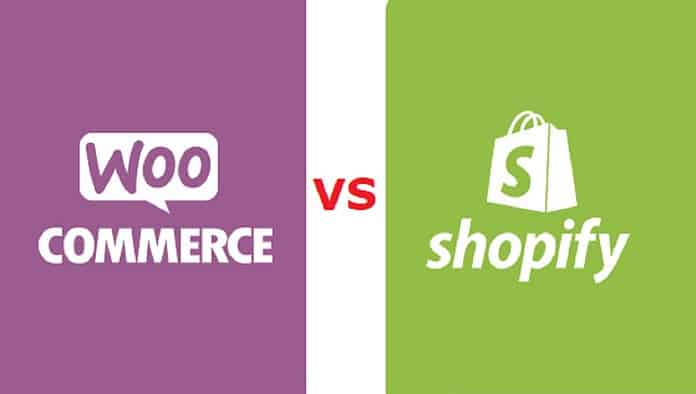In the world of eCommerce, two platforms stand out: WooCommerce and Shopify. These platforms offer a range of features and options that can make or break your online business.
Choosing the right platform is not just a matter of preference; it’s a critical business decision. Expert Opinion on WooCommerce and Shopify suggests that the platform you choose can significantly impact your store’s functionality and scalability.
In this article, we’ll delve into an at-a-glance comparison, and an in-depth analysis, and discuss e-commerce website development cost, customer support, SEO, and dropshipping. By the end, you’ll have a comprehensive understanding to make an informed choice.
At a Glance Comparison
Pricing Models
- WooCommerce: Primarily free but comes with additional costs for plugins and themes.
- Shopify: Starts at $29/month, with higher plans offering more features.
User Experience
Both platforms aim to offer a seamless user experience, but they approach it differently.
- WooCommerce: Known for its flexibility but has a steeper learning curve. Ideal for those who want complete control over their store.
- Shopify: Designed for ease of use. In-depth Comparison shows that Shopify’s user-friendly interface is one of its strongest points.
Customizability
- WooCommerce: Highly customizable with access to a myriad of WordPress plugins.
- Shopify: Less customizable but offers a range of in-house and third-party apps to extend functionality.
Pros and Cons
WooCommerce
Pros:
- Highly customizable
- Better SEO capabilities
- No monthly fees
Cons:
- Requires WordPress hosting
- Additional costs for plugins
Shopify
Pros:
- Easy to set up
- 24/7 customer support
- All-in-one solution
Cons:
- Less customizable
- Monthly subscription fees
Comparison Table of Woocommerce vs Shopify
| Feature / Criteria | WooCommerce | Shopify |
| Pricing | Free to use, but costs for hosting, plugins, and themes can add up. | Subscription-based, starting at $29/month. |
| User Experience | Steeper learning curve but offers more control. | User-friendly, designed for ease of use. |
| Customizability | Highly customizable due to open-source nature. | Less customizable but offers a range of apps to extend functionality. |
| Setup | Requires WordPress setup, hosting, and plugin installations. | All-in-one solution, quicker to set up. |
| Design and Themes | Unlimited customization with access to WordPress themes. | Ready-to-use themes with limited customization. |
| SEO Capabilities | Better SEO options with plugins like Yoast. | Basic SEO features, less customizable. |
| Dropshipping | Possible but requires additional plugins. | Easier with built-in apps like Oberlo. |
| Customer Support | Community-based, relies on forums and documentation. | 24/7 customer support via chat, email, and phone. |
| Payment Gateways | Supports multiple gateways, more flexibility. | Limited to Shopify Payments and select third-party gateways. |
| Transaction Fees | None, but payment gateways may charge fees. | Fees vary depending on the plan and payment gateway. |
| Inventory Management | Requires plugins for advanced features. | Built-in inventory management features. |
| Scalability | Scalable but may require performance optimization. | Easily scalable, handles everything from small to large stores. |
In-Depth Analysis
1. Features
WooCommerce: Open-source, Plugin Support
WooCommerce is an open-source platform that integrates seamlessly with WordPress. This gives you the freedom to modify every aspect of your store.
- Open-source Nature: Allows for extensive customization and control over your eCommerce site.
- Plugin Support: A vast array of plugins are available for SEO, payment gateways, and other functionalities.
According to Community Insights on WooCommerce vs Shopify, the open-source nature of WooCommerce is often cited as its most significant advantage.
Shopify: All-in-one Solution, App Integrations
Shopify is an all-in-one solution that takes care of hosting, security, and other technical aspects of running an online store.
- All-in-one: No need to worry about hosting, security, or backups.
- App Integrations: Shopify’s app store offers a wide range of add-ons to extend your store’s functionality.
In-depth Comparison reveals that Shopify’s all-in-one nature is particularly beneficial for those who prefer a hassle-free setup.
2. Setup and User Experience
WooCommerce: Steeper Learning Curve
WooCommerce offers a robust and flexible platform, but this comes at the cost of ease of use.
- Learning Curve: Requires a good understanding of WordPress.
- Setup: Involves multiple steps including hosting, installing WordPress, and setting up plugins.
Shopify: Easier Setup
Shopify offers a streamlined setup process that even beginners can navigate with ease.
- Ease of Use: Intuitive interface that guides you through the setup.
- Quick Setup: Get your store up and running in a matter of minutes.
3. Design and Themes
WooCommerce: More Customization
WooCommerce offers unlimited customization options when it comes to design.
- Themes: Access to numerous WordPress themes.
- Customization: Ability to tweak every aspect of your store’s design.
Shopify: Ready-to-use Themes
Shopify offers ready-to-use themes that you can apply with a single click.
- Theme Store: Choose from over 70 free and premium themes.
- Limited Customization: Customization is possible but within the constraints of the chosen theme.
This concludes the in-depth analysis of WooCommerce and Shopify. Each has its own set of advantages and disadvantages, and the best choice depends on your specific needs and skills.
4. Costs and Support
1. Costs
WooCommerce: Free but Additional Costs
WooCommerce is a free platform, but don’t let that fool you into thinking it’s entirely without costs.
- Hosting: You’ll need to pay for web hosting, which can range from $5 to $30 per month.
- Plugins and Themes: While many are free, premium options can add up.
- Domain and SSL: Additional costs for domain registration and SSL certificates.
According to Expert Opinion on WooCommerce and Shopify, these additional costs can sometimes make WooCommerce as expensive as Shopify, depending on your needs.
Shopify: Subscription-based
Shopify operates on a subscription-based model, with plans starting at $29 per month.
- Basic Plan: $29/month includes hosting, SSL, and other essential features.
- Higher Plans: More features but at a higher cost, up to $299/month.
- Transaction Fees: Vary depending on your plan and payment gateway.
In-depth Comparison shows that Shopify’s straightforward pricing can be both an advantage and a limitation, depending on your budget and needs.
2. Customer Support
WooCommerce: Community-based
WooCommerce support is largely community-based, meaning you’ll often rely on forums and documentation.
- Forums: Active community forums for troubleshooting.
- Documentation: Extensive but requires you to find solutions yourself.
Shopify: 24/7 Support
Shopify offers 24/7 customer support, a feature often highlighted as one of its major advantages.
- Immediate Assistance: Available via chat, email, or phone.
- Knowledge Base: Extensive guides and tutorials for common issues.
5. SEO and Dropshipping
WooCommerce: Better for SEO
WooCommerce has a slight edge when it comes to SEO capabilities.
- SEO Plugins: Access to powerful SEO plugins like Yoast.
- Meta Descriptions: Easier to customize meta descriptions, titles, and slugs.
According to Community Insights on WooCommerce vs Shopify, WooCommerce’s SEO features are often cited as a major advantage.
Shopify: Easier Dropshipping
Shopify excels in providing a smooth dropshipping experience.
- Dropshipping Apps: Apps like Oberlo make dropshipping a breeze.
- Automated Processes: Easier to manage inventory and orders.
In-depth Comparison shows that Shopify’s dropshipping capabilities are a strong selling point for many users.
Conclusion
In summary, both WooCommerce and Shopify have their own sets of pros and cons. Your choice between the two will depend on your specific needs, technical skills, and business goals. If you prioritize customization and SEO, WooCommerce may be the better option. On the other hand, if you value ease of use and dropshipping capabilities, Shopify could be the right fit.
FAQs
Is Shopify good for beginners?
- Yes, its user-friendly interface makes it ideal for beginners.
What’s the Best e-commerce Platform?
- It depends on your needs; both WooCommerce and Shopify have their merits.
What’s an SSL Certificate?
- It’s a security protocol to encrypt data between the user and the server.
Author Bio – Priyanka Prajapati, is a dedicated Content Manager at Brainspate – A Top Woocommerce Development company, and thrives on her love for e-commerce. With engaging writing, she enlightens readers, leaving an indelible impact on the digital landscape.








